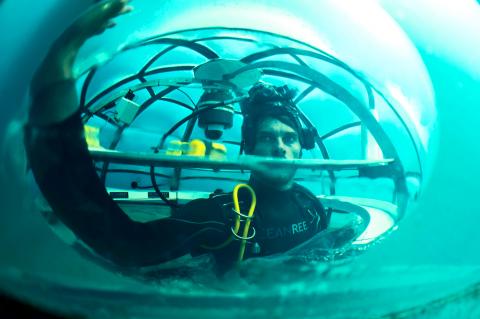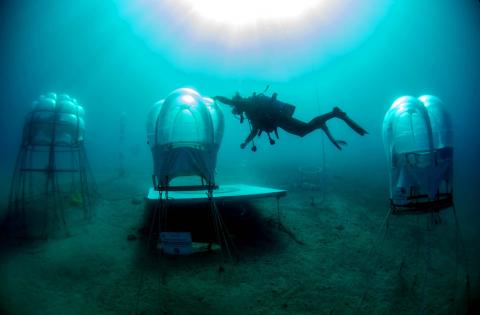In the homeland of pesto, a group of diving enthusiasts have come up with a way of growing basil beneath the sea that could revolutionize crop production in arid coastal areas around the world.
The pungent green herb has long been synonymous with the steep, terraced cliff-sides of Liguria, the northern Italian region known for its spectacular Riviera coastline and for producing one of the world’s best-loved pasta sauces.
Those two standout features of the region could now become even more intimately associated thanks to the pioneering efforts of Sergio Gamberini.

Photo: AFP
A diving nut and specialist in underwater communications, Gamberini has begun growing basil in large plastic spheres anchored to the sea bed 100m off shore and 8m below the surface in an experiment he has dubbed “Nemo’s Garden.”
“The idea came to me because I wanted to create more interaction between the surface and the diving activity,” Gamberini told AFPTV.
Having started with a simple plastic ball into which he placed a tub with herb seeds planted in compost, he is now in his fourth season of production from an underwater garden comprised of three “biospheres,” which he is allowed to keep in the water for three months a year.

Photo: AFP
“I chose a typical activity of farmers, and I said: ‘Why not bring it under water?’” he said. “I realized that there was an opportunity to create a new site to grow vegetables.”
Evaporation ensures humidity between 80 and 90 percent inside the spheres, the condensation provides the necessary moisture and, even well below the waves, there is enough light in that sunny corner of Europe to ensure the plants themselves regenerate their oxygen supply via photosynthesis.
Having proven the system works, Gamberini’s challenge now is to prove that it can produce herbs and vegetables in a cost-efficient way.
“I don’t know if it will be the future because we have to prove that it can be self-supportable,” he said. “If a pound of lettuce [grown underwater] costs too much, it won’t have a future.”
The primary advantage of underwater growing is the stability of thermal conditions.
“The sea maintains the temperature without a great difference between day and night,” said Gianni Fontanesi, who is in charge of running the project.
In late June, at the start of the European summer, the water on the coastal shelf of the northern Mediterranean is 25oC, while inside the spheres the temperature reaches 29oC.
The plants are thriving in an environment where they are protected from the insects and parasites that would normally be giving a basil grower headaches at this time of year.
The results so far have been encouraging, with the spheres producing more densely leafed plants than is usual — perfect for being ground up with pine nuts, parmesan and olive oil to produce authentic Ligurian pesto.
An experiment with lettuce is already underway and mushrooms, tomatoes and green beans will all be given a go this summer.
“In the longer term, this could be a solution for arid regions next to the sea,” said Gamberini, adding that there is still much work to be done to work out how to apply his principles on a larger scale.
However, he is not the only one to have faith in his idea: underwater basil was one of the 20 food-related innovations chosen to represent Italy at the ongoing World Expo in Milan, which has “Feeding the Planet, Energy for Life” as its theme.

Merida Industry Co (美利達) has seen signs of recovery in the US and European markets this year, as customers are gradually depleting their inventories, the bicycle maker told shareholders yesterday. Given robust growth in new orders at its Taiwanese factory, coupled with its subsidiaries’ improving performance, Merida said it remains confident about the bicycle market’s prospects and expects steady growth in its core business this year. CAUTION ON CHINA However, the company must handle the Chinese market with great caution, as sales of road bikes there have declined significantly, affecting its revenue and profitability, Merida said in a statement, adding that it would

i Gasoline and diesel prices at fuel stations are this week to rise NT$0.1 per liter, as tensions in the Middle East pushed crude oil prices higher last week, CPC Corp, Taiwan (台灣中油) and Formosa Petrochemical Corp (台塑石化) said yesterday. International crude oil prices last week rose for the third consecutive week due to an escalating conflict between Israel and Iran, as the market is concerned that the situation in the Middle East might affect crude oil supply, CPC and Formosa said in separate statements. Front-month Brent crude oil futures — the international oil benchmark — rose 3.75 percent to settle at US$77.01

RISING: Strong exports, and life insurance companies’ efforts to manage currency risks indicates the NT dollar would eventually pass the 29 level, an expert said The New Taiwan dollar yesterday rallied to its strongest in three years amid inflows to the nation’s stock market and broad-based weakness in the US dollar. Exporter sales of the US currency and a repatriation of funds from local asset managers also played a role, said two traders, who asked not to be identified as they were not authorized to speak publicly. State-owned banks were seen buying the greenback yesterday, but only at a moderate scale, the traders said. The local currency gained 0.77 percent, outperforming almost all of its Asian peers, to close at NT$29.165 per US dollar in Taipei trading yesterday. The

RECORD LOW: Global firms’ increased inventories, tariff disputes not yet impacting Taiwan and new graduates not yet entering the market contributed to the decrease Taiwan’s unemployment rate last month dropped to 3.3 percent, the lowest for the month in 25 years, as strong exports and resilient domestic demand boosted hiring across various sectors, the Directorate-General of Budget, Accounting and Statistics (DGBAS) said yesterday. After seasonal adjustments, the jobless rate eased to 3.34 percent, the best performance in 24 years, suggesting a stable labor market, although a mild increase is expected with the graduation season from this month through August, the statistics agency said. “Potential shocks from tariff disputes between the US and China have yet to affect Taiwan’s job market,” Census Department Deputy Director Tan Wen-ling